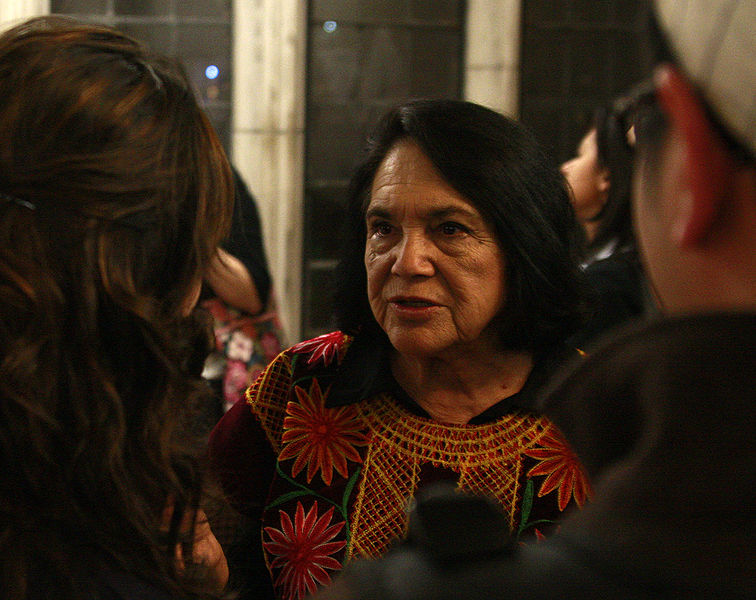Wednesday night I had the rare opportunity to meet someone I teach my students about: Dolores Huerta. She was a co-founder of the organization that would become the United Farm Workers. She has continued to work tirelessly for migrant workers, students, and workers in general, both Chicano/as and others. At 85 she’s still busy promoting these causes and working to increase voter turnout and political participation among the disadvantaged. When she came to my campus to speak she was just back from Texas, where she went door-to-door to speak with voters. Before that she’d been … she didn’t remember where, and was headed back to Texas for one day and then on to other parts of the nation. I can’t imaging that schedule now, and I’m far from her age.
For more on Huerta, especially the ways in which she had balanced her commitments to religion and feminism, see this essay below which I’ve written for my students:
Dolores Huerta is labor activist, feminist, and cofounder of the United Farm Workers.
Dolores was born in 1930 in Dawson, New Mexico. Her parents divorced when Huerta was young and she moved with her mother to a racially and ethnically diverse neighborhood in Stockton, California. Her mother supported the family by working as a waitress and cannery worker. Later Alicia Fernández owned her own restaurant and then a hotel. She provided Huerta with a middle-class upbringing. Huerta attended high school and college in Stockton, earning an AA from Stockton College.
After initially pursuing a career in education, she made the permanent change to social work and union organizing when she joined the Community Service Organization (CSO) in 1955. At the CSO she met and began working with Cesar Chavez. In 1962 they cofounded the National Farm Worker’s Association (NFWA), which would later develop into the United Farm Workers of America (UFW). Huerta helped lead the NFWA’s five year grape strike from 1965 to 1970. She took the leading responsibility for organizing the grape boycott for the area outside of California.
In 1968 she campaigned for Robert F. Kennedy as he sought the Democratic Party’s presidential nomination. She was with him on the podium at the Ambassador Hotel where he celebrated victory in the California primary. By the end of the night he was dead from an assassin’s bullet.
In 1970, as Vice President of the United Farm Workers of America she was the union’s lead negotiator in the agreement that ended the initial strike. When further boycotts were called against lettuce, Gallo wine, and table-grapes, in a battle with the Teamster’s union, Huerta again took the lead in the successful national actions. Her efforts were instrumental in gaining passage of the Agricultural Labor Relations Act (ALRA), a 1975 law that recognized the collective bargaining rights of agricultural workers in California for the first time.
After the passage of the ALRA, Huerta continued her work in a variety of settings. In 1988 she was hospitalized after being beaten by a police officer during a protest of presidential candidate George H. W. Bush. That same year she was named “Woman of the Year” by Ms. Magazine. She then took a two-year leave from her responsibilities at the UFW to promote the participation of Latina women in politics. In 2000 she chose not to run for reelection as secretary-treasurer of the UFW.
Huerta’s unique role in the UFW leadership has drawn attention to the role of women in the labor movement. But her life stands out more for the contrast it presents with both the majority of women in the movement and other feminist leaders. In fact, many women participated in the UFW and their efforts were crucial to the success of organizing efforts. But they traditionally took clerical and other supporting roles while men served in leadership positions and in more public, confrontational roles.
Huerta’s education achievements had already distinguished her from most of her Chicana and Mexicana contemporaries when she entered union work. She was also older than many Mexican American women of her generation when she got married. Then her first and second marriages both ended in divorce, leaving her to raise her then-seven children with the aid of extended family and friends while she continued her busy schedule of union work. She began serving in traditionally male capacities in the late 1950s and has continued to set a high bar for women’s participation in union leadership.
While working in New York on behalf of the boycott she began to accept and incorporate feminist perspectives into her organizing. In the early ‘70s she developed a romantic relationship with Richard Chávez, César’s brother. The couple had four children. Huerta credited the women’s movement for the courage to form and maintain their relationship. On the other hand, she has spoken out against abortion and contraceptives, putting her at odds with many feminists. Her familial choices have brought criticism from both sides, accusations that she is too traditional or too radical, insufficiently committed to her family or insufficiently free from such commitments. Like many pioneering women, Huerta has crafted her own unique blend of personal and cultural commitments.
(Featured image is “040809 nws huerta eg” by Eric Guo. (license info))


